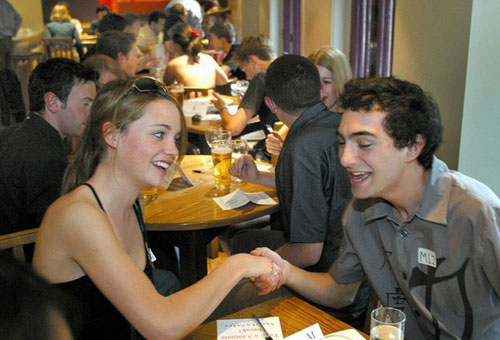
|
Women are twice as choosy as men when they go speed dating, research suggests. Why might that be? Trying to work out who is single in a bar, approach them and asking them out before you know anything about them is not a very efficient way of finding a girlfriend or boyfriend. There is a solution - speed dating, where a group of singles meet at an event in a bar or cafe. The men move from table to table for a fleeting date with each woman, lasting typically between three to four minutes. Afterwards the participants tell the organisers, often online, which people they want to see again. A recent study into speed dating habits concluded that if men and women go to an evening and have 22 separate dates, men are keen to see about five women again, while women would only choose to see two again, on average. The research was done by economists Michele Belot from the University of Edinburgh and her colleague Marco Francesconi from the University of Essex, who collected data from 84 speed dating events involving 3,600 people in the UK. This controlled environment is something that excites some economists as they are perfect for observing market forces at work- in this case the dating market. "This is something that evolutionary psychologists and biologists do recognise," says Belot. "We know that across a whole range of behaviours women tend to take fewer risks. "They relate this to the fact that making mistakes are much more costly for women than for men because of childbearing. So obviously if you make a mistake in dating the wrong man and having a relationship with the wrong man, you might have nine months carrying a child, then caring for a child. While for men, the costs are lower." Other academic worksuggests that because men historically have not been so involved in parenting, they devote more time to "short-term mating", so they're not looking further than a date. A study in the US, on the other hand, suggests the difference might simply be down to the seating arrangements, because the convention is for women to sit still at the events, while men move round and approach each woman. The researchers found that when the roles were reversed at speed dating events, and women moved round to approach the men, they found that women made more offers than they did at events when they sat still. One possible theory is that the person who moves has more confidence. Belot and Francesconi's study also took all the data provided by each person from their profile, to work out what attributes people were looking for in a potential mate. "For both men and women, education and professional status matters. We found that women prefer taller men and men prefer slimmer women," says Belot. Perhaps this is not a big surprise. But it turns out - people are often ready to compromise on these preferences. So, if a woman likes academic men, but she goes speed dating one night and no one is particularly academic, she will lower her expectations on this occasion, and instead pick men who next best fit her criteria. Belot thinks one explanation is that people who go to a speed dating event assume that is representative of the pool of available single people. But if you break out of the mould of what you think you want, it could actually be beneficial for society at large. People marry people very similar to themselves - from the same socio-economic background for example. And economists argue that this stops social mobility between generations. For instance, people from rich privileged backgrounds marry each other, while people from more disadvantaged backgrounds marry each other. But speed dating shows that people are not too fixed in their views of who they should date, says Belot, if they are given the opportunity. |
据英国广播公司报道,研究显示,约会的时候,女性的挑剔程度是男性的两倍。为什么会这样呢? 于是,我们试图在一间酒吧里找出谁是单身的,然后接近他们,在你还不了解他们任何情况的时候,就把他们约出来,以此来寻得女朋友或男朋友。但实践证明,这种方法不是特别的有效。 但有这样一个办法,就是速配的时候,一群单身者出现在酒吧或者咖啡馆。然后男人们开始从一个桌子移到另一个桌子,分别寻求与女人的约会,但这通常只持续三到四分钟。 但随后,参与者会通过网络方式告诉活动负责人他们希望能够再次约会的人。 最近的一项关于速配习惯的研究指出,如果一个男人和一个女人约会一晚上,之后再让他们分开22天,那么这段时间里男性会渴望能再约会五个女性,然而女性一般却只会想要再约会两个男性。 这项研究是由来自爱丁堡大学经济学家米歇尔贝洛特和她的来自从埃塞克斯大学的同事马可·弗兰切斯科所做,他们从英国84次速配活动中收集数据,其中约会人数达3600人。 这种可控制的环境让一些经济学家感到兴奋,因为它提供了观察婚介市场动态的极好条件。 “这是进化心理学家和生物学家都清楚的事。”贝洛特说道。“我们知道,在整体行为表现上,相比于男性,女性更倾向于选择风险更小的做事方法。 “他们更证明了这样一个事实,即相比于男性,女性付出的代价会更高,因为她们一不小心就有可能怀孕了。所以,很显然,如果你在约会的时候找错了人,并且和他发生了关系,那么你可能就要有9个月的时间挺着一个孩子,然后承担起照顾这个孩子的重任。但对于男人来说,却不存在这种情况,成本会低得多。“ 其他学术研究表明,因为男人从来都不会很投入于养育子女,他们只想花更多的时间来进行“短期交配”。所以约会的时候,他们从不会考虑以后。 另一方面,美国的一项研究显示,男女之间的不同,最低程度上可表现在坐时的表现上,因为向来的传统是,女性要表现的矜持,而男性则到处活动去搭讪每一个女的。 研究人员发现,在速配时,当角色互换,即女人到处活动去接近男人时,她们能比安静地坐着时制造更多的约会机会。这也许就证明了,更主动的人更自信。 贝洛特和弗兰切斯科尼还对速配人员的个人资料进行了研究,想要弄清在速配时人们都在寻找什么类型的人。 “其中发现男女双方都比较在意对方的教育和职业状况问题。而且女性更喜欢个子高的男子和男性更喜欢苗条的女人。“贝洛特说道。 也许,这不足以为怪。但它却证明了,人们更愿意在这些标准上多加考虑。 所以,如果一个女人只喜欢学术男,然后快速约会一晚上,发现他不是特别的学术,那么在这种情况下,她就会降低期望,寄希望于下一个也许最符合她标准男人。 贝洛特认为这种原因也许只有一种解释,就是速配的人把这看作是单身者的‘游泳池’,认为速配的机会多的是。 但是,如果你改变一下自己一直追求的那种类型,这实际上可能会有利于整个社会。 你想,人们通常是和自己有很大相似性的人结婚,比如,和自己有相同的社会经济背景等等。但是,经济学家认为,这会阻碍人群间的社会流动。 例如,富人和富人结婚,穷人和穷人结婚等等。 但速配显示,假如给他们提供更多的机会的话,他们想要和谁约会是不受限制的,贝洛特说道。 (译者 韩孟孟 编辑 丹妮) |